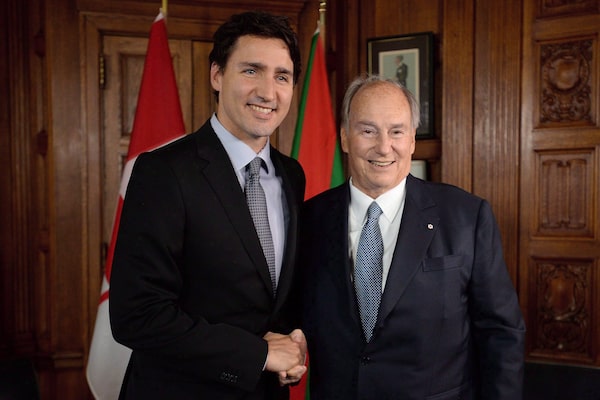
Prime Minister Justin Trudeau meets with the Aga Khan on Parliament Hill in Ottawa on May 17, 2016.Sean Kilpatrick/The Canadian Press
The Liberal government sidestepped opposition questions about an RCMP inquiry into Justin Trudeau’s family vacation at the Aga Khan’s Bahamian retreat, saying on Monday that the country faces more important issues than the Prime Minister’s past ethical conduct.
Conservative MPs told the House of Commons that Mr. Trudeau got a “get out of jail free card” after the RCMP decided not to charge him with fraud because the rules about accepting gifts from people doing business with Ottawa are murky.
Mr. Trudeau and his family went to the Aga Khan’s private island at Christmas, 2016, even though the Ismaili Muslim leader had millions of dollars in dealings with the federal government. In 2017, then-ethics commissioner Mary Dawson found he violated the Conflict of Interest Act by accepting the vacation, because of continuing official business between the government and the Aga Khan.
The Aga Khan Foundation Canada has received nearly $330-million from the federal government since 1981.
Documents newly obtained by the Conservative Party under access to information show the RCMP considered charging Mr. Trudeau with fraud in 2019, but decided against it because it was unclear if the Prime Minister had the authority to approve the all-expenses-paid gift for himself.
“The only reason the RCMP didn’t charge him was because he is the Prime Minister,” Conservative ethics critic James Bezan told the House of Commons on Monday. “So there is one law for the Prime Minister and another law for all the rest of us.”
The documents show the RCMP believed there were “reasonable grounds” to think fraud may have been committed, but the force decided it would not be in the public interest to lay charges because of a lack of clarity in federal rules that apply to accepting gifts.
Because Mr. Trudeau is the head of government, the RCMP said, “it cannot be definitely determined whether or not Mr. Trudeau can simply provide consent to himself.”
Mr. Bezan told MPs: “The RCMP said the Prime Minister was off the hook because he could have granted himself permission to accept the luxurious vacation gift worth $215,000.”
Mr. Bezan and fellow Conservative Luc Berthold pressed the government to say whether the Prime Minister had “granted himself the power to break the law.”
The Prime Minister was not in the Commons, but Government House Leader Mark Holland dodged the questions, accusing the opposition of dragging up an old story for partisan purposes.
“I would say there are a lot of pressing issues … we just had a budget tabled that takes action on housing, Indigenous reconciliation, the environment, and I would think those are important questions to be asking, Mr. Speaker,” he said.
Mr. Bezan later told The Globe that Parliament needs to dig further into the issue, including whether the RCMP interviewed the Prime Minister “on this specific issue of whether or not he granted himself his own authority.”
The Prime Minister’s Office has told The Globe Mr. Trudeau did not speak directly with the RCMP during their investigation.
Conservative leadership candidate Pierre Poilievre also jumped on the controversy. On Monday, he put out a statement on Twitter saying a double standard was at play.
“If a junior buying officer accepted a free vacation from someone selling pencils to government, he’d be charged. Yet Trudeau gets $200k in free vacations from a guy seeking millions in grants from him & RCMP says it is not ‘in the public interest’ to lay charges,” he tweeted.
The RCMP said in the documents that “it is unclear whether Mr. Trudeau can be prosecuted under Section 121(1)(c) of the Criminal Code, since the section has a provision which allows officials to accept benefits from individuals with government dealings, provided the official has the written consent of the head of their branch of government.”
According to the documents, Mr. Trudeau’s actions as Prime Minister “were arguably more damaging to the government of Canada’s appearance of integrity” than any similar actions carried out by a lower-ranking government official.
But the RCMP concluded that, aside from the low prospect of conviction, charging a sitting Prime Minister would cause damage that would “vastly outweigh” the negative effects of charging an ordinary member of the public.
The RCMP wrapped up the investigation on Sept. 25, 2019, saying in an internal document there was “insufficient evidence to proceed” with criminal charges.
The RCMP issued a statement to The Globe on Friday, saying the force did a “thorough and impartial analysis” and that their findings were independently validated by two separate third parties, including the Civilian Review and Complaints Commission for the Royal Canadian Mounted Police.
For subscribers: Get exclusive political news and analysis by signing up for the Politics Briefing.